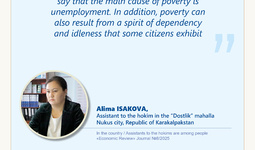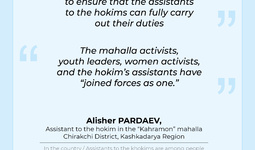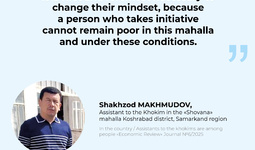— In our country, the "makhallabay" system was introduced for the first time. What is the nature of this position for you, how do you see and understand it?
– I believe that the main goal within the framework of the principle of "Human dignity" is to get to know the lives of people in every home. In this regard, the position of "assistant to the khokim" was created – a new institution in our country. The main task of this position is to be the representative of the khokim among the residents of the makhalla. It is necessary to study the interests, preferences and needs of the population, lifestyle and contribute to solving their problems as soon as possible. In addition, assistants to the khokim are a link, a bridge between citizens and the state.
— Tell us more about yourself and how you came to this position. How familiar were you with the work of the makhalla before, where you are now an assistant to the khokim? What is your past work experience that allows you to solve the tasks assigned?
– Before moving to this position, I worked in the Namangan Regional Regional Department of the Ministry of Innovative Development of the Republic of Uzbekistan. When I first read the news on telegram channels about the introduction of the position of assistant to the khokim in the makhallas, I had a desire to work in one of the makhallas of my native Turakurgan district. When the selection of candidates began, the khokimiyat of Turakurgan district asked me to move to the position of assistant to the khokim in this makhalla.
I had an idea about the Istiqlol makhalla, where I currently work, thanks to my experience working in the makhalla support department in the district. During my career, I have been able to significantly enrich the experience gained in previous positions. For example, in communicating with citizens, establishing contacts with enterprises and organizations, as well as in building trust on the part of the population.
– Tell us in detail about your makhalla. Where is it located, what is its size, what large enterprises are there for the work of residents of the makhalla, what types of activities are mainly engaged in by local people? What kind of social infrastructure facilities are there in the makhalla?
— In Istiqlol makhalla, 2,585 residents live in 532 houses. The makhalla is located 2-3 kilometers from the district center and is considered a mid-level makhalla. The territory of the makhalla consists mainly of residential buildings, most of the population works in enterprises, organizations and government organizations. There are 6 legal entities and 8 individual entrepreneurs in the region, there are shops, car maintenance points, bread and bakery products manufacturing enterprises, and service industries.
For additional income, residents are engaged in tailoring, animal husbandry and agriculture. Considering that previously there were no social infrastructure facilities in the makhalla, during my work 2 family organizations of preschool education were created, then the number grew to 4. The empty old building of the mahalla was renovated and the activities of clubs for children of the mahalla were organized in it.
– Which social groups make up the majority in the region, how many low-income people need support?
— Most of the region's population is employed in permanent and seasonal jobs. Over the past period, as a result of the practical work carried out with the "five" (now the "seven") makhallas, there are practically no poor families left in the region. However, a separate individual program has been developed for low-income and families in need of social protection, and measures are being taken to eliminate the problems of each family member who has a problem. For example, residents in need of medical care are supported by sending them to medical institutions. Actions are also being taken to create jobs for the unemployed and establish household activities. In addition, residents are provided with preferential loans and subsidies in accordance with their needs and desires.
– What are the main causes of poverty among the residents of the makhalla, which were identified as a result of the surveys? What approaches have been developed to solve the existing problems?
– During the study of honadonbai, we identified the main causes of poverty: self-doubt, lack of legal and economic knowledge, ignorance about ongoing reforms and the habit of dependency. Practical seminars were organized in the model and advanced makhalla households to solve the problems of this category of families. In order for the members of 15 insecure families to acquire entrepreneurial skills, we organized an excursion to the exhibition grounds of entrepreneurs in Namangan and Kokand. We actively promoted the work of entrepreneurs at various levels and generated interest in trade among the population.
— What kind of work was carried out on the development of entrepreneurship in the makhalla? What results have been achieved in 2023?
— Until 2022, there were only 6 business entities in the Istiqlol makhalla. As a result of the analysis of honadonbay, residents who want to do business were provided with preferential loans and subsidies. Due to the effective use of their capabilities, the number of entrepreneurs has increased to 15 engaged in trade, services and production. In addition, thanks to the development of entrepreneurship in the households of the makhalla, tailor workshops were organized in about 30 families, and greenhouse farms started operating in more than 40 families. My main task during my work was to develop entrepreneurial skills among the population and inspire confidence in their ability to achieve their goals.
– For the sustainable development of the makhalla, the availability and condition of transport, energy, communal, social and other infrastructure is important. What kind of work is being done in this regard?
— The makhalla belongs to the territory of the 2nd sector of the district. The development of infrastructure in the makhalla has a significant impact on the well-being of the population. Over the past three years, 3.7 km of internal roads have been concreted in cooperation with the sector, 100% of households have been provided with clean drinking water, 3 electrical substations and more than 6 km of the gas network have been completely repaired. At the request of residents, a 450-meter-long pedestrian walkway was built. Thanks to the sponsorship, night lighting and 8 surveillance cameras have been installed on two streets. We also carefully monitor the conditions created for children in private preschool institutions in makhalla.
– Today, our country is fighting against any manifestations of corruption. What do you do in your business to prevent cases of corruption?
— In order to avoid corruption situations in my work, my first thought is always about my family and how negatively this can affect my loved ones. The monthly salary provided by the state is enough for me. In addition, I try to conduct all business with the principles of transparency and accountability in accordance with the initiative of the "seven" of makhalla. I regularly provide reports on the work done to the Council. It also helps to prevent possible cases of corruption in the workflow.
— What are your plans for the further development of the makhalla in 2024?
— Based on the opportunities created by the state, one of our main goals is to increase the number of entrepreneurs and the effective use of each household of its household plot. In 2024, we plan to launch 4 micro-projects and increase the number of jobs. Having developed a detailed Roadmap for the implementation of social, economic and infrastructure projects in the mahalla, we plan to organize targeted events. Together with the responsible persons, we have developed a plan to free the mahalla from poverty by developing entrepreneurship and creating new jobs. We are making every effort to consistently implement this program.
— What suggestions do you have to improve the efficiency of the makhallabay work system?
— Our President has created all conditions for the effectiveness of the makhallabay system. In particular, the "seven" of makhallas were organized to solve problems in the makhalla itself. I am convinced that the effectiveness of the system can be achieved only with the close cooperation and consent of all participants.
— What has changed in the makhalla during your activity? Has the public's confidence in the institution of assistants to the khokim and the makhallabay system as a whole increased?
— In my opinion, the residents' trust in the makhalla institute has increased significantly. Regardless of who the citizens turn to, they are confident that their problems will be solved within the framework of the makhalla. To be honest, the residents of the makhalla call me khokim, which indicates confidence in the institution of the "assistant to the khokim". I believe that the makhallabay system of work plays an important role in the construction of a New Uzbekistan. This is confirmed by the positive mood of the residents of the makhalla, the ongoing construction and improvement of living conditions. All this indicates an increase in confidence in the system.
Jamoliddin Turdimov, CERR
"Economic Review" Journal №3/2023





















leave a comment